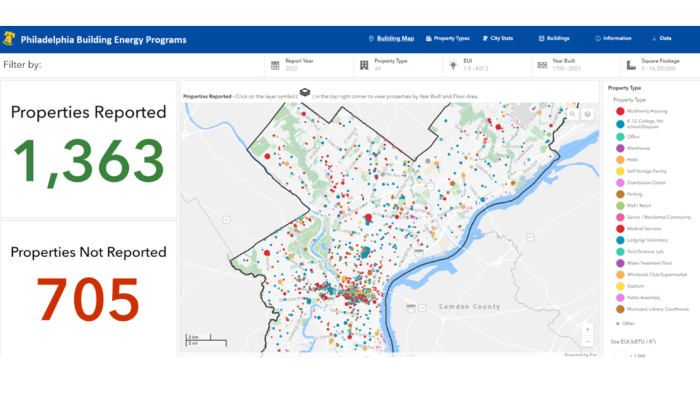
City of Philadelphia
- An official website of the City of Philadelphia government
- Here's how you know
- An official website
The Building Energy Benchmarking policy requires large commercial and multifamily buildings to report their energy and water use every year.
Jump to:
The Building Energy Benchmarking policy requires commercial and multifamily buildings 50,000 square feet and larger to report their energy and water use every year. Reporting is done using the U.S. EPA’s free ENERGY STAR Portfolio Manager tool.
This process, also called benchmarking, helps you compare your building’s performance with similar properties. You can use the data to better understand your energy and water use, find opportunities for cost savings, and improve efficiency. You will also receive information about utility efficiency rebate programs and other incentives.
Learn about the Benchmarking Program on our knowledgebase.
If you need help reporting your building’s energy and water use data, you can attend office hours with the compliance team. At office hours, you can get one-on-one technical assistance with:
Office hours are held remotely. To schedule an appointment, use the Bookings page or email benchmarkinghelp@phila.gov.
Commercial and multifamily buildings that are 50,000 square feet and larger must comply with the policy.
Benchmarking reports are due on June 30 of each year and must report all data from the previous calendar year. For example, reports due in June 2024 must include data from January 1–December 31, 2023.
Some buildings are exempt from the benchmarking policy if they meet certain criteria. For example, a building is exempt if its ownership changed and a full calendar year of utility bills isn’t available. Learn more about the criteria and how to file for an exemption.
Failure to comply to the Benchmarking Policy is a violation of Philadelphia Code. Building owners who do not comply on time will receive a fine. The fine is $300 after the first 30 days following the compliance deadline. If owners fail to comply after the first 30 days following the deadline, they will accrue an additional fine of $100 per day until the report is submitted.
There are three basic steps to benchmarking your building:
These should account for all energy and water used for the whole building.
If this is your first time completing benchmarking reporting, you’ll need to create a free Portfolio Manager account.
Find step-by-step instructions for these tasks on the Building Energy Benchmarking helpdesk. Learn how to:
We post articles and instructions for how to complete different benchmarking tasks on our knowledgebase.